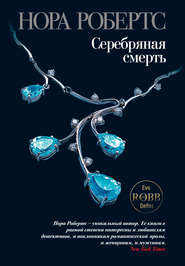По всем вопросам обращайтесь на: info@litportal.ru
(©) 2003-2025.
✖
Night Moves: the classic story from the queen of romance that you won’t be able to put down
Автор
Год написания книги
2018
Настройки чтения
Размер шрифта
Высота строк
Поля
“If he’s a smart man, he’ll take one look at that gully you call a road leading up here and keep on going.”
“But you brought your rented Mercedes all the way up.” Turning, she threw her arms around his neck and kissed him. “Don’t think I don’t appreciate that or the fact that you flew in from the Coast or that you care enough to be concerned. I appreciate all of it. I appreciate you.” She ruffled his hair, something no one else would’ve gotten away with. “Trust my judgment on this, C.J. I really do know what I’m doing. Professionally, my work can’t do anything but improve here.”
“That’s yet to be seen,” he muttered, but lifted a hand to touch her cheek. She was still young enough to have foolish dreams, he thought. Still sweet enough to believe in them. “You know it’s not your work I’m worried about.”
“I know.” Her voice softened, and with it her eyes, her mouth. She was not a woman who guided her emotions, but one who was guided by them. “I need the peace here. Do you know, this is the first time in my life I’ve gotten off the merry-go-round? I’m enjoying the solid ground, C.J.”
He knew her well and understood that there was no moving her, for the moment, from the position she’d taken. He understood, too, that from birth her life had been ribboned with the stuff of fantasies—and of nightmares. Perhaps she did need to compensate, for a time.
“I’ve got a plane to catch,” he grumbled. “As long as you insist on staying here, I want you to call me every day.”
Maggie kissed him again. “Once a week,” she countered. “You’ll have the completed score for Heat Dance in ten days.” With her arm around his waist, she led him to the end of the uneven, overgrown path where his Mercedes sat in incongruous splendor. “I love the film, C.J. It’s even better than I thought it would be when I first read the script. The music’s all but writing itself.”
He only grunted and cast one look behind him at the house. “If you get lonely—”
“I won’t.” With a quick laugh, Maggie nudged him into the car. “It’s been enlightening discovering how self-sufficient I can be. Now, have a nice trip back and stop worrying about me.”
Fat chance, he thought, automatically reaching in his briefcase to make certain his Dramamine was there. “Send me the score, and if it’s sensational, I might stop worrying … a little.”
“It is sensational.” She backed off from the car to give him room to turn around. “I’m sensational!” she shouted as the Mercedes began to inch around. “Tell everyone back on the Coast that I’ve decided to buy some goats and chickens.”
The Mercedes stopped dead. “Maggie …”
Laughing, she waved at him and backed down the path. “Not yet … but maybe in the fall.” She decided it was best to reassure him, or else he might get out and start again. “Oh, and send me some Godiva chocolates.”
That was more like it, C.J. thought, and put the car in gear again. She’d be back in L.A. in six weeks. He glanced in his rearview mirror as he started to drive away. He could see her, small and slender, still laughing, against the backdrop of the overgrown land, greening trees and dilapidated house. Once again he shuddered, but this time it wasn’t from an offense of his sensibilities. This time it was from something like fear. He had a sudden flash of certainty that she wasn’t safe there.
Shaking his head, C.J. reached in his pocket for his antacids as the car bumped noisily over a rock. Everyone told him he worried too much.
Lonely, Maggie thought as she watched the Mercedes bump and wind its way down her excuse for a lane. No, she wasn’t lonely. She was as certain as she’d ever been about anything that she’d never be lonely here. She felt an unexpected sense of foreboding that she shrugged off as ridiculous.
Wrapping her arms around herself, she turned in two slow circles. Trees rose up out of the rocky hillside. The leaves were hardly more than buds now, but in a few weeks they would grow and spread, turning the woods into a lush cover of green. She liked to imagine it that way and to try to picture it in the dead of winter—white, all white and black with ice clinging to the branches and shimmering on the rocks. In the fall there’d be a tapestry outside every window. She was far from lonely.
For the first time in her life, she had a chance to put her own stamp on a place. It wouldn’t be a copy of anything she’d had before or anything that’d been given to her. It was hers, absolutely, and so were any mistakes she made here, any triumphs. There’d be no press to compare this isolated spot in western Maryland with her mother’s mansion in Beverly Hills or her father’s villa in the south of France. If she was lucky, very, very lucky, Maggie thought with a satisfied sigh, there’d be no press at all. She could make her music and live her life in peace and solitude.
If she stood very still, if she closed her eyes and didn’t move, she could hear the music all around her. Not birdsong but the ruffle of air through branches and tiny leaves. If she concentrated, she could hear the faint trickle of the narrow creek that ran along the other side of the lane. The quality of silence was rich, flowing over her like a symphony.
There was a place for glitz, she mused, and for glamour. She simply didn’t want that place any longer. The truth was she hadn’t wanted that place for a very long time but hadn’t known the way out. When your birth had been celebrated by the international press, your first step, your first words, cataloged for the public, it was natural to forget there was another way of life.
Her mother had been one of the greatest blues and ballad singers in America, her father a child actor turned successful film director. Their courtship and marriage had been followed religiously by fans around the world. The birth of their daughter had been an event treated like the birth of royalty. And Maggie had lived the life of a pampered princess. Gold carousels and white fur coats. She’d been lucky because her parents had adored her, and each other. That had compensated for the make-believe, often hard-edged world of show business, with all its demands and inconstancy. Her world had been cushioned by wealth and love, rippled continually with publicity.
The paparazzi haunted her on dates through her teenage years—to her amusement but often to the boys’ frustration. Maggie had accepted the fact that her life was public domain. It had never been otherwise.
And when her parents’ private plane had crashed into the Swiss Alps, the press had frozen her grief in glossies and newsprint. She hadn’t tried to stop it; she’d realized that the world had mourned with her. She’d been eighteen when the fabric of her world had torn.
Then there had been Jerry. First friend, then lover, then husband. With him, her life had drifted into more fantasy, and more tragedy.
She wouldn’t think of any of that now, Maggie told herself as she picked up her spade and began to fight the tough soil again. All that was really left of that portion of her life was her music. That she would never give up. She couldn’t have if she’d tried. It was part of her the way her eyes and ears were part of her. She composed words and music and twined them together, not effortlessly, as it sometimes seemed from the fluid finished result, but obsessively, wonderingly, constantly. Unlike her mother, she didn’t perform but fed other performers with her gift.
At twenty-eight, she had two Oscars, five Grammies and a Tony. She could sit at the piano and play any song she’d ever written from memory. The awards were still in the packing boxes that had been shipped from L.A.
The little flower plot she was planting in a spot perhaps no one would see but herself was a labor of love with no guarantee of success. It was enough that it gave her pleasure to add her own peculiar spot of color to the land she’d claimed as hers. Maggie began to sing as she worked. She’d completely forgotten her former feeling of apprehension.
Normally he didn’t do the estimating and initial planning on a job himself. Not anymore. For the past six years Cliff Delaney had been in the position of being able to send one or two of his best men out on the first stage of a project; then he would fine-tune. If the job was interesting enough, he would visit the site while work was in progress, perhaps handle some of the grading and planting himself. He was making an exception.
He knew the old Morgan place. It had been built by a Morgan, even as the tiny community a few miles away had been named after one. For ten years, since William Morgan’s car had crashed into the Potomac, the house had stood empty. The house had always been stern, the land formidable. But with the right touch, the right insight, Cliff knew, it could be magnificent. He had his doubts that the lady from L.A. had the right insight.
He knew of her. Naturally he knew of her. Anyone who hadn’t spent the last twenty-eight years in a cave knew Maggie Fitzgerald. At the moment, she was the biggest news in Morganville—all but eclipsing the hot gossip of Lloyd Messner’s wife running off with the bank manager.
It was a simple town, the kind that moved slowly. The kind of town where everyone took pride in the acquisition of a new fire engine and the yearly Founder’s Day parade. That’s why Cliff chose to live there after he’d reached a point where he could live anywhere he chose. He’d grown up there and understood the people, their unity and their possessiveness. He understood their failings. More, perhaps much more, than that, he understood the land. He had serious doubts that the glamorous song writer from California would understand either.
C.J. had estimated six weeks before she flew back. Cliff, without ever setting eyes on her, cut that in half. But perhaps before Maggie Fitzgerald grew bored with her shot at rural living, he could put his own mark on the land.
He turned off the paved road onto the quarter-mile lane that cut through the Morgan property. It had been years since he’d been on it, and it was worse than he remembered. Rain and neglect had worn ruts in the dirt. From both sides of the lane, branches reached out to whip at the truck. The first order of business would be the lane itself, Cliff thought as his small pickup bounced over ruts. It would be graded, leveled, filled. Drainage ditches would have to be dug, gravel spread.
He went slowly, not for the truck’s sake but because the land on either side of the lane appealed to him. It was wild and primitive, timeless. He’d want to work with that, incorporate his own talents with the genius of nature. If Maggie Fitzgerald wanted blacktop and hothouse plants, she’d come to the wrong place. He’d be the first one to let her know.
If he had a distrust of outsiders, Cliff considered he’d come by it honestly. They came, often from the rich suburbs of D.C., and wanted their lawns flat and free of the poplar and oak that had first claim. They wanted neat little flowers in orderly rows. Lawns should be even, so that their mowers could handle the weekly cutting effortlessly. What they wanted, Cliff thought derisively, was to say they lived in the country while they brought city attitudes and city tastes with them. By the time he rounded the last bend, he was already out of patience with Maggie Fitzgerald.
Maggie heard the truck coming before it was in sight. That was something else she liked about her new home. It was quiet—so quiet that the sound of a truck, which would have been ignored in the city, brought her to attention. Halfheartedly brushing her hands on the seat of her pants, she rose from her planting, then shielded her eyes against the sun.
While she watched, the truck rounded the curve and parked where the Mercedes had been only an hour before. A bit dusty from the road, with its chrome dull rather than gleaming, the truck looked much more comfortable than the luxury car had. Though she couldn’t yet see the driver through the glare of sun on windshield, Maggie smiled and lifted a hand in greeting.
The first thing Cliff thought was that she was smaller than he’d expected, more delicate in build. The Fitzgeralds had always been larger than life. He wondered, with a quick grunt, if she’d want to raise orchids to match her style. He got out of the truck, convinced she was going to annoy him.
Perhaps it was because she’d been expecting another Mr. Bog that Maggie felt a flutter of surprise when Cliff stepped out of the truck. Or perhaps, she thought with her usual penchant for honesty, it was because he was quite simply a magnificent example of manhood. Six-two, Maggie decided, with an impressive breadth of shoulders. Black hair that had been ruffled by the wind through the open truck windows fell over his forehead and ears in loose waves. He didn’t smile, but his mouth was sculpted, sensual. She had a fleeting regret that he wore dark glasses so that his eyes were hidden. She judged people from their eyes.
Instead, Maggie summed him up from the way he moved—loosely, confidently. Athletic, she concluded, as he strode over the uneven ground. Definitely self-assured. He was still a yard away when she got the unmistakable impression that he wasn’t particularly friendly.
“Miss Fitzgerald?”
“Yes.” Giving him a neutral smile, Maggie held out a hand. “You’re from Delaney’s?”
“That’s right.” Their hands met, briefly, hers soft, his hard, both of them capable. Without bothering to identify himself, Cliff scanned the grounds. “You wanted an estimate on some landscaping.”
Maggie followed his gaze, and this time her smile held amusement. “Obviously I need something. Does your company perform miracles?”
“We do the job.” He glanced down at the splash of color behind her, wilted pansies and soggy petunias. Her effort touched something in him that he ignored, telling himself she’d be bored long before it was time to pull the first weeds. “Why don’t you tell me what you have in mind?”
“A glass of iced tea at the moment. Look around while I get some; then we’ll talk about it.” She’d been giving orders without a second thought all her life. After giving this one, Maggie turned and climbed the rickety steps to the porch. Behind the tinted glasses, Cliff’s eyes narrowed.
Designer jeans, he thought with a smirk as he watched the graceful sway of hips before the screen door banged shut at her back. And the solitaire on the thin chain around her neck had been no less than a carat. Just what game was little Miss Hollywood playing? She’d left a trace of her scent behind, something soft and subtle that would nag at a man’s senses. Shrugging, he turned his back on the house and looked at the land.
It could be shaped and structured without being tamed. It should never lose its basic unruly sense by being manicured, though he admitted the years of neglect had given the rougher side of nature too much of an advantage. Still, he wouldn’t level it for her. Cliff had turned down more than one job because the client had insisted on altering the land’s personality. Even with that, he wouldn’t have called himself an artist. He was a businessman. His business was the land.
He walked farther away from the house, toward a grove of trees overrun with tangling vines, greedy saplings and thistles. Without effort he could see it cleared of undergrowth, richly mulched, naturalized perhaps with jonquils. That one section would personify peace, as he saw it. Hitching his thumbs in his back pockets, Cliff reflected that from the reams that had been written about Maggie Fitzgerald over the years, she didn’t go in much for peace.
Jet-setting, the fast lane, glitter and glitz. What the hell had she moved out here for?

















